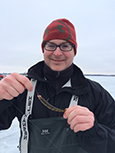Public Lecture
Wed. Nov. 22 12:30 PM
- Wed. Nov. 22 01:20 PM
Location: 5L24 Lockhart Hall
Freshwater biota and rising pCO2
 CO2 injected into freshwater ecosystems may be an effective method for controlling the spread of invasive species, specifically bigheaded carps. Studies have shown fish will avoid high pCO2 areas, suggesting that plumes of high CO2 in water bodies may be an effective barrier to fish movement. We have completed a series of studies to determine whether exposure to high CO2 alters native fishes and mussels. Key findings have shown that CO2 alters some common fish behaviors, and mussels exposed to CO2 have been found to undergo stress responses.
CO2 injected into freshwater ecosystems may be an effective method for controlling the spread of invasive species, specifically bigheaded carps. Studies have shown fish will avoid high pCO2 areas, suggesting that plumes of high CO2 in water bodies may be an effective barrier to fish movement. We have completed a series of studies to determine whether exposure to high CO2 alters native fishes and mussels. Key findings have shown that CO2 alters some common fish behaviors, and mussels exposed to CO2 have been found to undergo stress responses.
Dr. Hasler comes from eastern Ontario and completed his B.Sc.H in Biology and Geographic Information Systems at Queen’s University. He then did a M.Sc. in biology at Queen’s, working on the winter biology of largemouth bass. Following his M.Sc., Caleb moved up and then down the Rideau Canal to Carleton University where he completed his Ph.D., which investigated the impacts of hydropower operations and infrastructure on fish biology. Not knowing where to turn to next, Caleb ended up working for Dillon Consulting in Ottawa where he managed a multi-year population study on the threatened Blanding’s Turtle. The allure of academia then brought Dr. Hasler to the University of Illinois, Urbana-Champaign, where he worked on the development of a CO2 barrier to prevent the movement of Bigheaded carp into the Great Lakes. Finally, Caleb is now an Assistant Professor in the Department of Biology at The University of Winnipeg.
